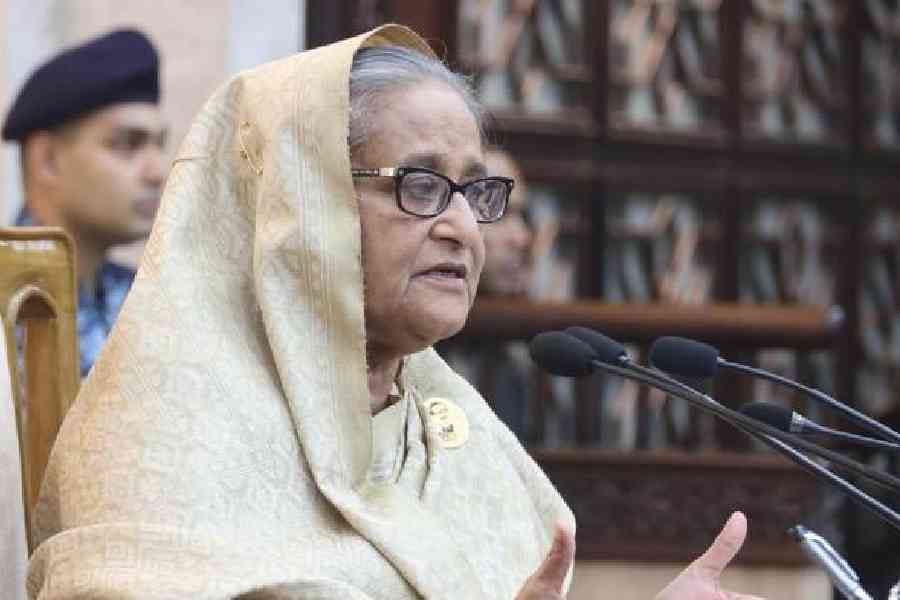Bangladesh Prime Minister Sheikh Hasina assured the business community on Monday that the situation in the country will improve gradually, the promise coming in the backdrop of unprecedented violence for over a week that slammed the brakes on all types of business activities in the country after the government imposed curfew and deployed the armed forces.
“We have managed to restore peace to some extent... The situation will improve gradually and curfew restrictions will be relaxed,” Hasina reportedly told representatives of the apex chambers of commerce in the country during a meeting held at her office.
During the meeting, the Premier also told the audience that the government — which has been on the backfoot since a student protest snowballed into a political crisis — will not hesitate in taking “stern action” against those trying to create instability in the country by resorting to violence.
The comment assumes significance in the backdrop of reports from the media that the law enforcing agencies launched a massive crackdown in the last 24 hours and arrested over 500 people in connection with the violence during the job quota protests in which at least 141 people died.
Opposition parties like the BNP and the Jamaat-e-Islami complained in their social media handles that some of their leaders were arrested as the government tried to muzzle a “movement of the people” by force.
During her interaction with the business community, Hasina defended all the government actions like imposition of curfew and deployment of the armed forces.
“I don’t know what kind of movement it was in which they tried to set public and private properties on fire... We had created a perfect environment for business in our country, but some vested interest groups tried to destabilise the country with these acts of arson,” said the Prime Minister.
“We had to impose the curfew to save the lives and properties of people,” she reportedly added, before rolling out a list of public properties that were vandalised or set on fire during the movement.
In a statement titled, “Contemporary developments in Bangladesh”, and issued by the information ministry on Monday, the government clarified that it was always on the same page with the students and demonstrated its commitment to dialogue with them. Then, it went on to blame the BNP and Jamaat-e-Islami for the acts of arson across Bengal during the quota reform protests that was launched by the students, aggrieved with 30 per cent reservation for the kin of war heroes, who had taken part in the Liberation War of 1971.
According to the statement, the “BNP and its extremist ally Jamaat-e-Islmai” tried to take advantage of the student protests to pursue their agenda of “unconstitutional power grab through violence and terrorism.”
Sources in Dhaka said that Bangladesh foreign minister Hasan Mahmud tried to highlight the same points during a briefing that the government organised for representatives of foreign missions on Sunday. There were reports in some sections of the media that the minister faced a lot of “uncomfortable questions” from the audience on alleged excesses by the law enforcers during their clashes with the protestors.
Hasina, however, did not have such awkward moments during the meeting with the business community as the representatives of the trade bodies expressed their full confidence in the Prime Minister. They urged her to restore Internet connection as soon as possible to facilitate the businesses, especially readymade garments exports, which is the major source of foreign exchange for Bangladesh.
“We have clients across the globe and these are major global brands... We have a lot of commitments towards our clients. Our factories are shut due to the strife. The situation must return to normal as soon as possible for the sake of the Bangladesh economy,” owner of a textile company told this correspondent from Dubai.
“I am in transit after meeting clients in Europe... There were attempts to burn down my factory and I know the situation is volatile back in my country, but I have to return to be by the side of my employees and resume work,” added the businessman.
While the government and the trade bodies are keen on resumption of normal business activities, there are several challenges that lie ahead of Bangladesh.
“The students have to return to the campuses and call off the protest as their main demand for quota reform was met after the Supreme Court scaled back quota to only 7 per cent... The protesting students, however, have not given any such signal as of now, which is worrying,” said a source in Dhaka.
The other major factor, which will determine the course of movement, will be the extent of response that the BNP and the Jamaat receive to their call for a bigger movement against the Hasina government.
“Nobel laureate Muhammad Yunus, who is a known Hasina baiter, will be another factor... He has already given a call to the international community to prevail upon Hasina to stop the atrocities on the students and restore phone and Internet connectivity. His call was prominently featured in the BNP social media site,” said a strategic affairs expert while adding that anti-Hasina forces are trying to come together.
“It remains to be seen how Hasina handles the evolving situation,” said the source, refusing to comment on the likely outcome.
UAE Bangladeshis
A court in the UAE sentenced dozens of Bangladeshi nationals to prison, including three for life imprisonment, over protests against their home government in the Gulf country, state media said, adds PTI.
The Abu Dhabi Federal Court of Appeal on Sunday handed 10-year prison sentences to 53 Bangladeshi nationals and an 11-year term to another Bangladeshi national, in addition to the three life imprisonments











